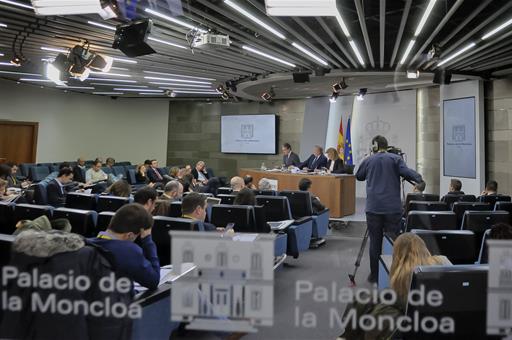Council of Ministers
Government approves Spanish Employment Activation Strategy 2017-2020
Council of Ministers - 2017.12.15
Moncloa Palace, Madrid
The Minister for Employment and Social Security, Fátima Báñez, stressed at the press conference following the Council of Ministers, that the government's main priority remains "bedding down the economic recovery through strong job creation in order not to leave anyone behind".
Fátima Báñez recalled that two thirds of the jobs shed during the crisis have now been recovered, an achievement that she attributed to the reforms and the commitment from workers, companies, independent contractors, social stakeholders and regional governments. The Minister for Employment also underlined that job creation is being reflected in the reduction in the poverty and inequality indicators in Spain.
Among the instruments to speed up the transition from unemployment to employment, Fátima Báñez mentioned the importance of the Spanish Employment Activation Strategy; the 2014-2016 Strategy "radically changed" the coordination, planning and activation of the unemployed, and today the Council of Ministers has approved the renewal of "everything we have learned" for the period 2017-2020.
Balance of active employment policies
The minister explained that the strategy structures all the actions through a new organisational framework and planning over several years divided into annual plans, with specific measures at a general level and for each region according to the needs of their productive fabrics. Fátima Báñez highlighted that the strategy "guides the use of resources, and that the results will be sent to regional governments by the corresponding Sector Conference".
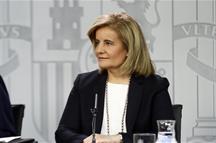 Pool Moncloa/ JM CuadradoThe balance is positive, according to the minister, who pointed out that the degree of insertion of job-seekers registered with the public employment services has risen by 10 points, the level of employability of the most vulnerable groups has increased by 38% and the number of people who have begun an economic activity as independent contractors after receiving personalised attention from these public services has doubled.
Pool Moncloa/ JM CuadradoThe balance is positive, according to the minister, who pointed out that the degree of insertion of job-seekers registered with the public employment services has risen by 10 points, the level of employability of the most vulnerable groups has increased by 38% and the number of people who have begun an economic activity as independent contractors after receiving personalised attention from these public services has doubled.
She remarked that the aim now is "to bed down this recovery with new opportunities", since there are still more than 3.4 million people out of work in Spain and it is necessary to continue the strong creation of jobs to reach the goal of 20 million people in work. Furthermore, Fátima Báñez pointed out that it is necessary to reduce the number of long-term unemployed, boost continuous training and improve the quality of jobs in the public sector. In this regard, the minister announced that henceforth all public job offers made by any authority will have to include "social clauses".
The Annual Employment Policy Plan was allocated 5.58 billion euros in funding this year, 310 million euros more than in 2016. Of this amount, 2.46 billion euros were allocated to job insertion, 2.26 billion to training and the rest to career advice for the unemployed.
Financing of railway transport
The Council of Ministers approved the list of railway services declared to be public service obligations.
The Minister for Public Works, Íñigo de la Serna, explained that this raft of services is unprofitable and no economic operator will provide them, and hence the government will assume them in order to guarantee territorial structure and the right to mobility of citizens. Íñigo de la Serna quoted the number of travellers that benefit from these services as 322 million, which includes suburban trains, medium distance trains - both conventional and high-speed - and those services provides on the metric gauge network (known as FEVE).
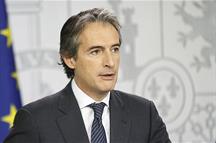 Pool Moncloa/ JM CuadradoThe Minister for Public Works highlighted that the declaration approved on Friday is the first in almost five years; it seeks to take on board regional requests and represents, "for the first time in many years" an extension of the services. He pointed out that the government will contribute 937 million euros next year with the aim of making up the deficit in these services, 40 million more than to date.
Pool Moncloa/ JM CuadradoThe Minister for Public Works highlighted that the declaration approved on Friday is the first in almost five years; it seeks to take on board regional requests and represents, "for the first time in many years" an extension of the services. He pointed out that the government will contribute 937 million euros next year with the aim of making up the deficit in these services, 40 million more than to date.
Accordingly, all of the current railway services will be maintained, and certain additional services will be offered, such as Alicante-Villena, Castellón-Vinarós and Villarrubia-Córdoba-Rabanales-Alcolea, and improvements in the services provided on suburban trains in Asturias, Cantabria and Madrid will be carried out. As regards the AVANT services, these are added to the high-speed lines between Madrid and Cuenca, and Madrid and Salamanca for those travellers that frequently use the service.
New regulatory framework for drones
The government approved a Royal Decree to regulate the use of remotely controlled aircraft (drones), "a clearly thriving sector", according to the Minister for Public Works, who announced that a strategic plan for their development will shortly be presented.
The new regulation allows for more flexible use, whilst guaranteeing the safety of operations. Professional use will be allowed to over populated areas, people, in controlled airspace and at night-time, after presenting a safety study and following prior authorisation from the State Air Safety Agency (Spanish acronym: AESA).
Improved air quality
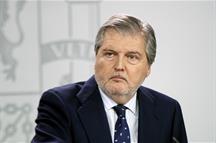 Pool Moncloa/ JM CuadradoThe Council of Ministers approved the National Air Quality Plan 2017-2019 (Plan Aire II), which includes a total of 52 measures and receives an overall budgetary provision of 276 million euros.
Pool Moncloa/ JM CuadradoThe Council of Ministers approved the National Air Quality Plan 2017-2019 (Plan Aire II), which includes a total of 52 measures and receives an overall budgetary provision of 276 million euros.
The Minister for Education, Culture and Sport and Government Spokesperson, Íñigo Méndez de Vigo, explained that, taking into account that most powers in this area correspond to the regional governments and local authorities, the plan is "a framework of reference" to improve air quality in Spain.
The minister specified that its objectives include compliance with national and international legislation, a reduction in the most contaminating emissions and enhanced information on air quality for preventative ends.
Other agreements
- Approval of 39th Combined Agricultural Insurance Plan.
- Municipal census figures declared official.
- 200,000-euro subsidy for start up of Mas Miró gastronomic restaurant.
- 6 million euros to improve water management for agricultural irrigation in Canary Islands.
Application of Article 155 of the Constitution
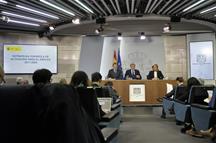 Pool Moncloa/JM CuadradoAfter the ordinary meeting, the Council of Ministers held another extraordinary meeting to adopt agreements on the application of Article 155 of the Constitution in Catalonia.
Pool Moncloa/JM CuadradoAfter the ordinary meeting, the Council of Ministers held another extraordinary meeting to adopt agreements on the application of Article 155 of the Constitution in Catalonia.
Íñigo Méndez de Vigo explained that the government has overruled the agreements reached by the Regional Government of Catalonia that provided for the centralisation of State tax payments and contributions corresponding to Catalan public enterprises. He also mentioned the liquidation of the Board of Trustees of Mon Catalonia-Public Diplomacy Council of Catalonia (Diplocat).
The Government Delegate in Catalonia, Enric Millo, provided further details of all the decisions related to this region at a press conference in Barcelona.
Weekly assessment
Íñigo Méndez de Vigo reviewed the milestones on the government's international agenda in recent days. First of all, he mentioned the attendance by the President of the Government at the Climate Summit held in Paris on 12 December, which made clear "Europe's political leadership" and "the existence of a political framework for strengthening public-private cooperation" to tackle climate change.
Secondly, the Government Spokesperson mentioned the recent fisheries agreement at an EU level, "where the Spanish delegation managed to improve its quotas in negotiations on most of the species of interest to Spain".
Lastly, Íñigo Méndez de Vigo referred to the participation of the Minister for Foreign Affairs, Alfonso Dastis, at the Joint Summit of the Sahel countries held in Paris on 13 December, one more example of "Spain's commitment" to permanent structured cooperation through the European Union.
Growth with social projection
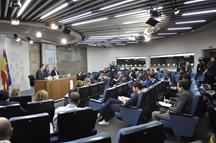 Pool Moncloa/ JM CuadradoOn an economic plane, the Government Spokesperson reviewed some figures which, in his opinion, reflect "the upward trend of the Spanish economy", such as the increase in October in the number of companies set up in Spain, the increase in the number of real estate operations in the third quarter of the year and the record highs posted by Spanish exports in 2017.
Pool Moncloa/ JM CuadradoOn an economic plane, the Government Spokesperson reviewed some figures which, in his opinion, reflect "the upward trend of the Spanish economy", such as the increase in October in the number of companies set up in Spain, the increase in the number of real estate operations in the third quarter of the year and the record highs posted by Spanish exports in 2017.
Íñigo Méndez de Vigo put these improvements down to the structural reforms and budget policy, and argued that economic growth is "integrating" and has a "social projection".
"These figures are all good news that, in order to persist, require political and economic stability", declared the minister, who said that the government trusts that the General State Budget for 2018 "will be approved as soon as possible", to provide tranquillity and certainty.
At the start of his speech at the press conference following the Council of Ministers, Íñigo Méndez de Vigo passed on the government's condolences over the murder of two Guardia Civil officers and a civilian in the province of Teruel. The Minister for Home Affairs, Juan Ignacio Zoido, suspended his attendance at the meeting of the Council of Ministers, to travel to the village of Alcañiz (Teruel), where the funeral chapel has been set up for the two Guardia Civil officers in the local council offices.
Current affairs
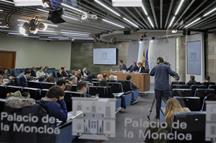 Pool Moncloa/ JM CuadradoWhen asked about the effect that the letter sent by FIFA to the Spanish Football Federation on possible interference by the government in elections to the federation may have on Spain's participation in the 2018 World Cup in Russia, the Minister for Education, Culture and Sport stressed that "the presence of the Spanish team at the World Cup is not in any danger".
Pool Moncloa/ JM CuadradoWhen asked about the effect that the letter sent by FIFA to the Spanish Football Federation on possible interference by the government in elections to the federation may have on Spain's participation in the 2018 World Cup in Russia, the Minister for Education, Culture and Sport stressed that "the presence of the Spanish team at the World Cup is not in any danger".
He also declared that the government has acted "transparently and with respect for the law", and that the federation, under the presidency of Juan Luis Larrea, "is functioning perfectly well".
As regards the security measures adopted for the elections in Catalonia on 21 December, and specifically, on the issue of cyber-security, Íñigo Méndez de Vigo asserted that the government, "as it always does", is taking all possible measures to avoid the will of the people being meddled with and in order to ensure that the elections unfold with "all normality".
Non official translation





